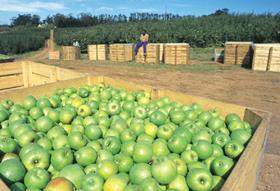
This season is proving to be one of the most profitable in the last 10 years for South Africa’s apple and pear growers, as various factors have combined to make it a special year.
At the same time, the results from the present season signal a continuation of the recovery of the South African topfruit sector that started in 2004, with four strong years in a row.
“If we rate this season in terms of success, we have to give it nine out of 10,” said Stefan Conradie, product manager at the South African Apple and Pear Producers’ Association (SAAPPA).
“While New Zealand and Chile shipped less apples and pears, we had a bumper crop, with shipments increasing by about 5 per cent. The last of the Golden Delicious, Granny Smith and Pink Lady apples are now being shipped, but our forecast indicates that we will reach about 24.6m cartons of apples and 13m cartons of pears.”
In a strong market, with relative shortages during parts of the season, the crop has enabled South Africans to maximise their returns. Even EU Class II products found an eager market and in many cases fruit that would have been sold in Africa or the local market was also exported to customers in Europe, where demand in Eastern Europe was particularly good.
The 2008 pear crop surprised the South African industry. Pears traditionally follow an on-and-off yearly pattern, but for the second year in a row exports peaked around the 13m mark.
“We experienced a strong stable market with price inflation resulting in higher prices in original currency for all our products, particularly in the UK which is such a key market for our industry,” said Mr Conradie.
With the South African currency having declined significantly against the euro and the British pound since last year and remaining at these low levels throughout the South African season, the benefits have been clear.
Despite the euphoria brought about by the exceptional season, the South African growers have their feet firmly on the ground. They realise that a number of favourable factors combined to produce the result, and are also acutely aware that production costs driven by higher fuel prices will still hit them before the start of their new season.



